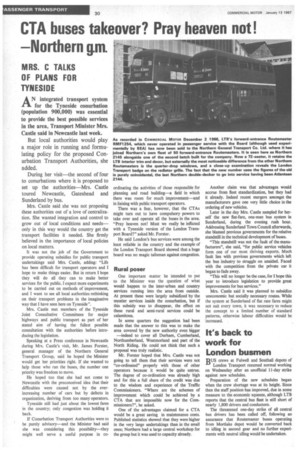CTA buses takeover? Pray heaven not!
Page 32

If you've noticed an error in this article please click here to report it so we can fix it.
Northern g.m.
MRS. C TALKS OF PLANS FOR TYNESIDE
AN integrated transport system for the Tyneside conurbation (population 900,000) was essential to provide the best possible services in the area, Transport Minister Mrs. Castle said in Newcastle last week.
But local authorities would play a major role in running and forrnuEating policy for the proposed Conurbation Transport Authorities, she added.
During her visit—the second of four to conurbations where it is proposed to set up the authorities—Mrs. Castle toured Newcastle, Gateshead and Sunderland by bus.
Mrs. Castle said she was not proposing these authorities out of a love of centralization. She wanted integration and control to grow out of local conditions and needs— only in this way would the country get the
transport facilities it needed. She firmly believed in the importance of local policies on local matters.
It was not the job of the Government to provide operating subsidies for public transport undertakings said Mrs. Castle, adding: "Life has been difficult for transport operators and I hope to make things easier. But in return I hope they will do all they can to make better services for the public. I expect more experiments to be carried out on methods of improvement, and I want to see all local authorities rethinking on their transport problems in the imaginative way that I have seen here on Tyneside".
Mrs. Castle met members of the Tyneside Joint Consultative Committees for major highways and public transport as part of her stated aim of having the fullest possible consultation with the authorities before introducing the legislation.
Speaking at a Press conference in Newcastle during Mrs. Castle's visit, Mr. James Forster, general manager of the Northern General Transport Group, said he hoped the Minister would get her priorities right. If she wanted to help those who ran the buses, the number one priority was freedom to move.
He hoped too that she had not come to Newcastle with the preconceived idea that their difficulties were caused not by the everincreasing number of cars but by defects in organization, deriving from too many operators.
Tyneside still had just about the lowest fares in the country; only congestion was holding it back.
If Conurbation Transport Authorities were to be purely advisory—and the Minister had said she was considering this possibility—they might well serve a useful purpose in co
ordinating the activities of those responsible for planning and road building—a field in which there was room for much improvement—and in liaising with public transport operators.
There was a fear, however, that the CTAs might turn out to have compulsory powers to take over and operate all the buses in the area. "Pray heaven not Must we really be inflicted with a Tyneside version of the London Transport Board?" asked Mr. Forster.
He said London's bus services were among the least reliable in the country and the example of the London Transport Board showed that a huge board was no magic talisman against congestion.
Rural poser
One important matter he intended to put to the Minister was the question of what would happen to the inter-urban and country services running into the area from outside. At present these were largely subsidized by the meatier services inside the conurbation, but if this subsidy was to disappear, the effect on these rural and semi-rural services could be calamitous.
In some quarters the suggestion had been made that the answer to this was to make the area covered by the new authority even bigger —indeed to cover all Durham, Ctunbertand, Northumberland, Westmorland and part of the North Riding. He could not think that such a proposal was truly realistic.
Mr. Forster hoped that Mrs. Castle was not going to tell them that their services were not "co-ordinated" property with those of other operators because it would be quite untrue. The degree of co-ordination was already high and for this a full share of the credit was due to the wisdom and experience of the Traffic Commissioners. "Where are the schemes of improvement which could be achieved by a CTA that are impossible now for the Commissioners?", he asked.
One of the advantages claimed for a CTA would be a great saving in maintenance costs. Published statistics showed that they were higher in the very large undertakings than in the small ones; Northern had a large central workshop for the group but it was used to capacity already. Another claim was that advantages would accrue from fleet standardization, but they had it already. Indeed recent mergers amongst the manufacturers gave one very little choice in the ordering of new vehicles.
Later in the day Mrs. Castle sampled for herself the new flat-fare, one-man bus system in Sunderland, during the evening rush hour. Addressing Sunderland Town Council afterwards, she blamed previous governments for the relative standstill in the technical development of buses.
"This standstill was not the fault of the manufacturers", she said, "for public service vehicles form one of our most thriving exports. Much fault lies with previous governments which left the bus industry to struggle on unaided. Faced with the competition from the private car it began to fade away.
"This will no longer be the case, for I hope this year to introduce legislation to provide great improvements for bus services."
Mrs. Castle said it was planned to subsidize uneconomic but socially necessary routes. While the system at Sunderland of flat rate fares might not suit every town, it was necessary to reduce the concept to a limited number of standard patterns, otherwise labour difficulties would be increased.








































































































